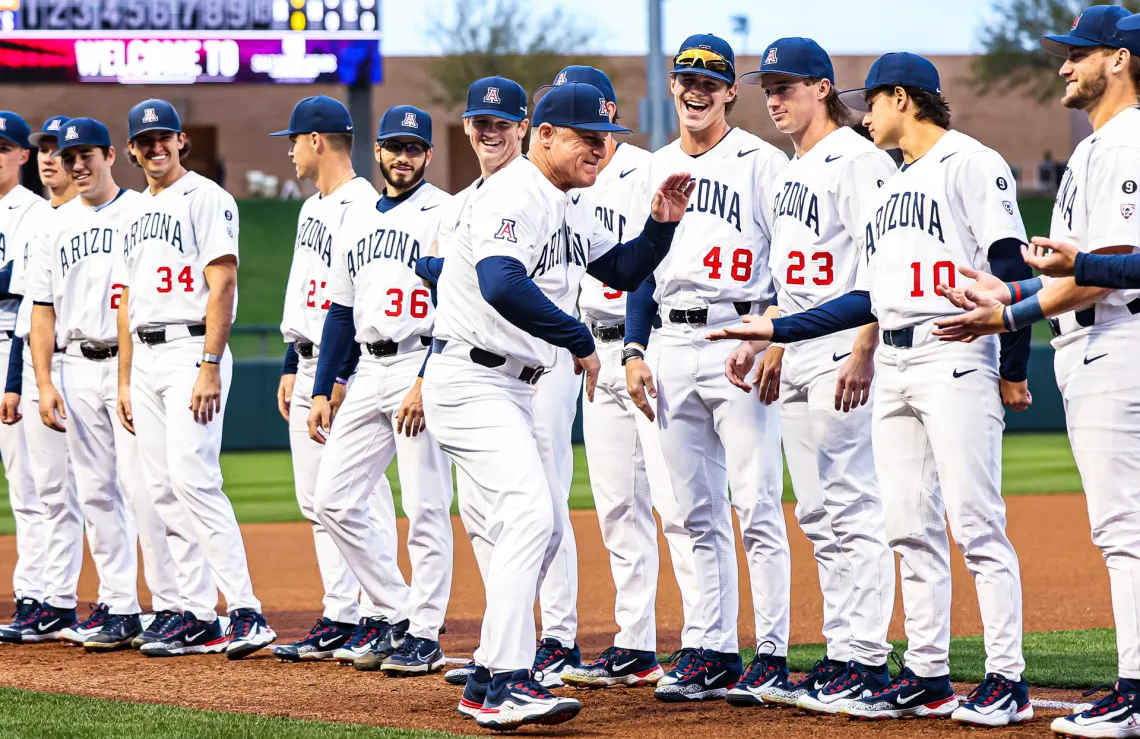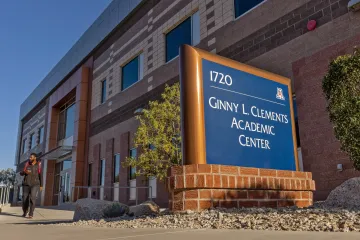Never Chase A Number
C.A.T.S. Program Focuses on Process, Not Results, as Arizona Student-Athletes Set GPA Record.

UArizona Baseball coach and team celebrating with high-fives and smiles
Chris Richards
Fans of Arizona basketball, volleyball and gymnastics know McKale Memorial Center as the arena where Wildcat athletes cement their legacies. Right across the street, however, Arizona’s sports stars chase another goal: to be superb students.
They do so as a team, just like on the field or in the gym. But in the Ginny L. Clements Academic Center, it doesn’t matter what sport a student-athlete plays. Sprinters, swimmers and shortstops study within the same four walls.
Together, they form a community built around their shared experience as student-athletes, says Marisol Quiroz ’01 ’04 ’21, director/assistant athletics director of C.A.T.S. Academics within Arizona Athletics.
“In this building, there’s a community that is built around the student experience versus the athletic experience,” Quiroz says. “But through the student experience, student-athletes can also relate to each other because of the athletic experience. They may not have the same practice, but they all go to practice, and so they can empathize with each other. I love to see that happening in our space.”
C.A.T.S., short for Commitment to an Athlete’s Total Success, supports student-athletes in their coursework and more, from recruitment onward. The program covers five areas — academics, student-athlete development, medical, strength and conditioning, and clinical and sport psychology — but Quiroz’s team has a specific focus. “Our main goal is to ensure that students have a clear and supported pathway to graduation,” she says.
C.A.T.S. Academics assists student-athletes in all 22 varsity sports, providing day-to-day support — especially during students’ first year, when they are adapting to circumstances wholly new. The staff includes not only learning specialists, who build time-management and study habits, but also academic counselors, who help with course and major selection and remain available post-graduation. There are also part-time staff, including tutors who are content experts.
C.A.T.S. moved into the 15,000-squarefoot Clements center in fall 2016 after previously operating out of McKale, where the program had about a third of its present room. In the Clements center, C.A.T.S. Academics books about 400 tutoring appointments per week — and more than 1,250 total appointments for full-time and part-time staff, says Quiroz, who is from Tucson and began at C.A.T.S. Academics in 2003.

Ginny L. Clements Academic Center
Chris Richards
The building — named in honor of Ginny L. Clements, who also established the Ginny L. Clements Breast Cancer Research Institute — features study areas, labs and a full-sized classroom. But Quiroz says that the interactions inside those spaces are what make the center irreplaceable. Together, Arizona student-athletes form friendships, and together they thrive.
Arizona Athletics achieved a program-record 3.3 GPA in the fall 2022 semester, part of an ongoing trend toward higher academic achievement. Quiroz’s staff helped drive the accomplishment, but she says that C.A.T.S. Academics doesn’t focus on numbers, only classroom comprehension and preparedness.
“This is what I continue to tell staff: ‘We don’t want to be chasing a number. We want to just continue to focus on supporting our students. If we continue to evaluate and re-evaluate our services and how we are supporting our students, the numbers will follow,’” she says.
During the pandemic, Quiroz says, C.A.T.S. Academics has confronted challenges and changes mirroring larger shifts within student-athlete academic support — and within the world of work generally. Her team, she says, has navigated these obstacles with admirable determination.
“I can’t thank them enough for their work,” she says.
A “GODSEND” FOR STUDENT-ATHLETES
In the fall, Arizona’s student-athletes became eligible for extra financial aid — up to $5,980 per year, based on academic performance — following the U.S. Supreme Court’s 9-0 decision in National Collegiate Athletic Association v. Alston. The Alston ruling changes the calculus for walk-on and partial-scholarship student athletes on campuses across America.
The Arizona baseball team, for instance, has a roster of 39 players. But coach Chip Hale ’87 and his staff can divide only 11.7 athletic scholarships among 27 athletes per season. In practice, this means that no Wildcat baseball player competes on a full athletic scholarship, and 12 do not receive any athletic aid, says Hale.
If a baseball player has his entire education paid for, Hale says, he finds himself in that position because of combined athletic and academic merit aid. Baseball is not the only sport like this; scholarships are awarded similarly in track and field, men’s tennis, swimming and diving and others. In contrast, basketball, football and volleyball award full athletic scholarships.
On teams like Hale’s, then, student-athletes’ living circumstances could be meaningfully improved by the funding, offered at Arizona through the suitably named 5980 Academic Fund. In some cases, student-athletes with partial aid may now be fully covered. And now, Hale says, none of his players are true walk-ons, the term for athletes who play their way on to the team with neither a scholarship nor the promise of one to come.
“All of a sudden,” he says, “these guys have a little more money in their pocket to pay for their education. It’s just a godsend for us as a sport."
Dave Heeke, director of Arizona Athletics, says that the funding aligns with the program’s values.
“This new academic benefit for our student-athletes is the latest addition to our mission to develop academic, athletic and life champions,” Heeke says.
Arizona is an early adopter of the funding, initially offered by the University of Mississippi, where the first 5980 scholarship funds were likely used by All-American long jumper Allen Gordon in November 2021, per Sports Illustrated. Arizona was able to set up the 5980 Academic Fund thanks to a donor’s anonymous gift, which also endowed a position in C.A.T.S. Student-Athlete Development.
“On the West Coast, we’re one of the few schools doing 5980 right now,” Hale says. “It gives us a leg up.”
Make a Gift
Student-athlete success is supported by the ongoing Commitment to an Athlete's Total Success (C.A.T.S.) program. We invite you to help by making a contribution to the 5980 Fund.

